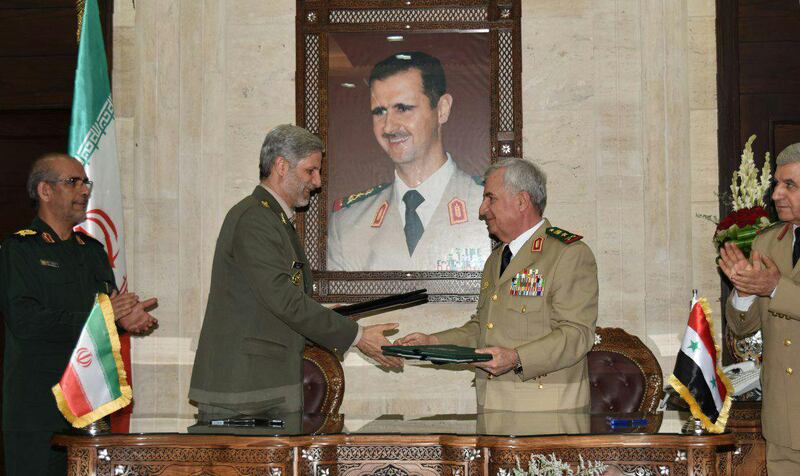Iran is asserting its dominance in Syria’s post-war reconstruction drive, at a time when Gulf states are pushing for the reinstatement of diplomatic relations with the cash-strapped government in Damascus.
Iranian public and private companies will be granted priority in Syria’s post-war reconstruction, Syria’s Minister of Economy and Foreign Trade Mohammad Samer Al Khalil said on Sunday, after signing a long-term economic cooperation agreement with senior Iranian officials in Tehran.
The agreement calls for “comprehensive cooperation at the financial and banking levels,” and “contributes to facilitating trade” and investment between the two countries, Mr Al Khalil said, according to the state-run Sana news agency.
“We are looking forward to improving cooperation in the economic field,” Mr Al Khalil was cited as saying.
For his part, Iranian Minister of Roads and Urban Development Mohammad Eslami said that the agreement signed on Sunday was only the beginning of “broad” cooperation between the two countries in the future.
The announcement comes less than a week after the UAE reopened its embassy in Damascus for the first time in seven years. Bahrain has also said it will soon restore its mission to the country.
The diplomatic detente has raised speculation regarding the role of the Gulf countries in funding reconstruction.
According to the Syria Report, an economic digest, several companies from the UAE are looking to restore investments in Syria and have started to send delegations to Damascus.
Prior to 2011, UAE companies invested in Syria's real estate sector. Emaar Properties, for example, was in charge of the Eighth Gate development in Damascus, the Syria Report said.
US President Donald Trump this month said that Saudi Arabia will assume Washington's role in funding Syria's reconstruction. However, an official at the Saudi embassy in Washington told CNBC news that the kingdom has not made any major new financial pledge to Syria since it pledged 100 million in August.
__________
Read More:
Analysis: Return of UAE mission to Damascus suggests Gulf states want a say in Syria's future
Decades of relations between the UAE and Syria resume
Assad claims Arab states and West beginning Damascus re-engagement
__________
Iran has been a primary economic and military backer of the Syrian government since the start of the conflict in 2011. The director of Syria’s state-run oil company, Moustafa Haswiya said in October that Iran covers Syria’s oil deficit by shipping two million barrels of oil every month to the war-torn country.
Syria’s current oil production of 23,000 barrels per day is only enough to cover 10 per cent of the market demand.
Iranian oil imports are paid through an Iranian credit line. Since 2013, Tehran has granted several credit lines to Syria including $1 billion in January 2017- of which half is dedicated to oil imports.
Now, as fighting dials-down across the country, Tehran is slated to reap lucrative rewards for helping President Bashar Al Assad maintain control over the country.
In a sign of its deepening economic role after years of fighting, Iran struck a deal with Damascus in October to build a $460 million power plant in Syria’s coastal city of Latakia.
Iran has also announced plans to construct an oil refinery in the Syrian city of Homs after the conflict ends. The estimated cost of the facility is $1 billion. At full capacity, it is expected to produce up to 140,000 barrels per day.
In January 2017, the Syrian government and Tehran signed a memorandum of understanding to cooperate in a phosphate mine in Syria’s Al Sharqiya, one of the largest in the country, located 50 kilometres southwest of the ancient Syrian city of Palmyra.
The contract allows Iranian companies exploration, extraction and investment of phosphate for 50 years. Its current output is unknown, but in 2009, its total production capacity reached 800,000 tons
In September last year, Syria and Iran signed several agreements worth $ 142.5 million. During a visit to Tehran, the Syrian Minister of Electricity signed two contracts and a memorandum of understanding with his Iranian counterpart. If the deal comes through, Iranian companies would be involved in the supply or restoration of more than 2,000 MW of power production capacity.





